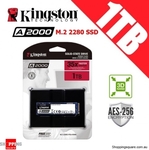Kingston A2000 1TB M.2 SSD $159.89 + Shipping
Kingston A2000 1TB M.2 SSD $159.89, 500GB $89.96, Kingston A400 480GB SSD SSD $74.95 + Del @ Shopping Square
Related Stores
closed Comments

Less than an MX500!

1TB compared to Samsung Evo 970 plus pickup at $280 ? is the speed and warranty worth it for the sammy after cash back ?

I'm using the 1TB in my build now, fast as anything, well worth it for less than $200.

Using the 500GB, also very good. Just a shame either it doesn't like my motherboard or my motherboard doesn't like it, write speeds are shiiit but I have no other SSDs to daily drive with and I was denied return because the motherboard is at fault despite me using a different NVMe SSD in it and it working just fine. When it's in my laptop it's blazing fast.

Which MB are you using?

@Blizzard57: The Biostar B45M2. Works fine with other SSDs. By write speeds being shit I mean it just freezes every 5 seconds in the middle of a write operation.

@jsediv: I'd skip the A2000 then, good as it is I wouldn't want to risk it. NVMe is fine, because I tried a different NVMe drive with no issues. Now I haven't tinkered with flashing older BIOSes, but I can't be bothered because it'll mess up my memory OC. I'd go so far as trying to avoid any SSD with the SM2263EN controller altogether.

Have you tried updating the drive's firmware?

@Perch: Yes, I've tried everything except for an old BIOS version, but that'd mess up my RAM OC which is no fun.

The Evo 970 is lightning quick for sure, but some things to consider:
-you can probably use half a dozen or so SATA drives, but only 1-2 n.2 NVME's unless you buy and use PCI-E adapters
-like you pointed out, for economy, the cheaper SATA is very cost effective, 75% price premium for the NVME driveI think having a fast NVME drive is often worth it, but mainly for things which truly use the speed- for example I thrash to mine for analysis if I run out of RAM. Even a lot of programs won't fully realise the benefits of the NVME drives, and most games will still play exceptionally well from a regular SSD and will see little if any benefit from a faster drive.
Given the size of most AAA titles if you have a steam library that creeps in size I'd just put it on a SATA SSD and add more storage as you need. If you're confident you need speed, get the NVME drive as large as you can justify then add SATA SSD for more standard storage/programs/things you access a lot, or spinning disk for even more standard storage.

Not bad..but still COVID prices :(

after caskback, $100 cheaper than samsung Evo970 plus 1TB ….. thing is the drive will be in the PC for the next 2-3 years, so $1 per week more for samsung vs kingston over 2 years.

Is the a2000 m.2 an nvme drive or just m.2 sata? Already running low on space on my 256gb nvme boot drive, if this is better than a crucial P1 1tb I might jump.
Kingston reliability vs crucial?

This is NVMe. It is using TLC NAND, likely Toshiba ones (but don't quote me on that though). Better than Crucial P1 in terms of speed. This SSD was released before P1. Neither has been around long enough to be considered reliable enough.

Is the a2000 m.2 an nvme drive or just m.2 sata?
The A2000 is an NVMe drive: https://www.kingston.com/en/ssd/a2000-nvme-pcie-ssd
if this is better than a crucial P1 1tb
It should be slightly faster than a P1 in most use cases if you update the firmware for the drive. If you don't update the firmware, performance will be similar between the two drives in most use cases. You can see a performance summary here which includes a result for the P1 1TB: https://www.techpowerup.com/review/kingston-a2000-1-tb-m-2-n…
Kingston reliability vs crucial?
If you mean on a drive-vs-drive basis (A2000 vs P1) rather than brand-vs-brand, the A2000 would be expected to have superior write endurance to the P1 because the A2000 uses TLC flash while the P1 uses QLC (TLC is almost always more durable). That of course doesn't guarantee reliability, but there's also no firm metric on reliability itself unless you happen to have a large sample of drives to test with.

Crucial P1's sustained write is inferior, cannot even beat MX300, 850 EVO. If you only care about SLC cache performance, then I guess P1 is decent enough. Not a fan of QLC NVMe SSDs though.

Most users don't need sustained write performance beyond the SLC cache, and would be perfectly happy with a P1 in terms of performance.
https://www.anandtech.com/show/13512/the-crucial-p1-1tb-ssd-…
Overall the Crucial P1 is primarily aimed at consumer machines, and that definitely seems like the segment it's best suited for. A typical consumer use case would involve most of the large data on the drive coming from things like movies and video games that are rarely modified […]
That leaves the Crucial P1 as usually being very fast, and definitely faster overall than any SATA SSD. The use of QLC NAND doesn't cripple the drive, and is a detail that most consumers don't have to care about.
https://www.techpowerup.com/review/crucial-p1-nvme-m-2-ssd-1…
In our real-life performance testing, the Crucial P1 does very well […]
As long as there is space left in the pSLC buffer, writes fly, with a constant 1,600 MB/s. This keeps up for a surprisingly long time; in our testing, we had to write data at maximum speed for almost 10 minutes, 120 GB in total, until the write buffer was exhausted.
It's highly unlikely you'll ever write that much data anyway […] Once the drive is idle, the SLC buffer gets flushed to QLC, which quickly restores full write performance.

@MHLoppy: Thanks both for that info. Can't find the $131 P1 anywhere and my time machine is busted (new flux capacitor required) so no going back to when they were cheaper. Can pick this up for $169 locally tomorrow so same price as this one shipped to me. Should do for a year or two, then can be a hand me down os drive for the Mrs next machine! Last SSD I fitted to hers had 6% use after 3 years!

new flux capacitor required
Be sure to set up a notification for new deals on one! :P https://www.ozbargain.com.au/search/node/flux%20capacitor?t=…

@MHLoppy: P1's random read and write performance does degrade a lot as the drive is filled up.
If you only use SLC cache for NVMe, then honestly, your usage pattern doesn't actually need NVMe (SATA3 will do). Besides, how do you actually fully utilise the SLC cache? You need to pump data quick enough, and guess what, that means another NVMe SSD (or RAM drive).
https://www.anandtech.com/show/13512/the-crucial-p1-1tb-ssd-…
If you look at mixed random read/write, it shows that as the drive fills up, the SLC cache diminishes and the QLC ugly side shows up. So, if you are the kind of person who over-provision your SSD and you will keep your P1 to at most half filled, then I guess it is okay. Problem is, the price saving isn't worth the trouble.
Remember, if you are only able to get those sequential read/write values when running benchmark in your real life situation, then sequential read/write isn't that important / realistic for you. I don't want to encourage SSD makers to cheat. SLC cache with TLC is already cheating. SLC cache with QLC is clearly cheating even more. The performance degrades much sharply as the QLC based drive fills up.

P1's random read and write performance does degrade a lot as the drive is filled up.
Yes, I have read both the reviews I linked. I am aware of the impact. If you look at the review you can also see that the SLC cache size scales from 100GB to a minimum of 12GB as the drive fills up. Even at near-full, most consumer workloads won't be saturating the reduced-size SLC cache.
To quote the review: "[…] it does mean that the drive's variable-size SLC cache could end up quite small. On balance, even that small cache should be adequate given the limited amount of data that does change with most consumer workloads"
SLC cache with TLC is already cheating.
This is.. an interesting take. I would go the other way and say that smart cache usage is a way to make high capacity drives cheaper without sacrificing much performance most of the time. Do you consider a DRAM cache "cheating"? If so, why not? It's basically the same principle, just at a smaller scale.

@MHLoppy: All form of caching and using the results on those is cheating. All NVMe SSDs essentially cheat.
12GB - that feels like a figure that most benchmark software won't be affected. A random read/write that's 65% of TLC SATA3 SSD isn't something that can be ignored.
I don't see the real point of quoting SLC cache performance, especially on sequential for general public. As I stated earlier, you need something that's just as fast or faster to really take advantage of that.
Also, if you were to copy entire data from a 1TB SATA3 SSD to this P1 QLC NVMe SSD, you will get an average write speed slightly worse than WD 7200rpm 1TB hard drive.
The drive is fine at the beginning, when it is not filled, but the performance degradation is something people need to be aware of.

They are lousy. I order SD card a while ago and still trying it get it delivered.

Hi
If you can PM me with order number, I might be able to help.
cheers
WOW it was Indian stock anyway Delivered finally.

Cheers for the advice, should we discuss how dodgy this site is so someone doesn't waste time buying from them and never receiving the item?

Very Tempting!

I keep seeing here all the time that there's no real world noticeable difference between a 3,000MB/s nvme drive and a 500MB/s sata drive.
If that's true, then is there any noticeable performance difference between this and a Samsung?
Shopping Square…I almost thought it was Shopping express which is very reliable.

Keep in mind if you look at A2000’s previous deals it appears some people are having issues with it in desktop based motherboards. Laptops have better results in terms of comparability.

Mine has been working perfect so far, I think the issue is around certain RGB software conflicting with it and causing BSOD. I dont use any RGB software.

Lol that's me no just my Biostar board, probably just something up with the BIOS or the SSD's firmware doesn't like it. I doubt this'd happen on a more popular board.

Just sharing my experience with the Kingston A2000 purchased from centrecom. Returned it in a day as the part was being detected when connected for the first time and then couldn't get it to work.
Wasted 6 hrs of initial setup etc and now got WD Blue
WHat board are you using? Works fine on mine.

Z390 gigabyte pro wifi

Thats wierd, I'm on a X570 MSI Meg Ace.

The interesting bit is the centercom rep tested it in his pc and the nvme was super hot for no reason and did freeze the pc on motherboard display

what kind of PCI adaptor to use for this?

Do you have stock to ship or do people have to wait weeks, leave multiple tickets and post all over your Facebook to get a reply to get their money back?

Hi
If you have problem with your order with us, you may PM me with order details, I might be able to help
cheers


Good price for the A2000!